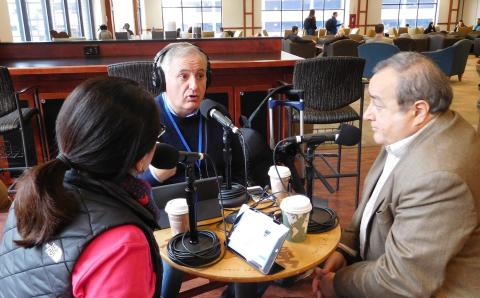“Is there anything in our worship that we have in common?” Some variation of that question has been asked multiple times during Worship Ministries advisory committee meetings. You might not guess that the Korean pastor, the African-American worship leader who embodies a Pentecostal fervor, the newly commissioned pastor of a Navajo church, the Latina pastor of a Reformed Bapt-a-costal Chicago church, and the millennial worship pastor of a Dutch immigrant congregation could all be a part of the same denomination. And that list doesn't even include every member of our advisory team, let alone the diversity of churches in the Christian Reformed Church. Is there anything in our worship that unites us?
As we wrestled together with that question, trying to understand each other more fully, we concluded that indeed there is much more that unites than divides. What “divides” are the things we readily see on the surface: varying worship expressions, music that sounds different, sermons of varying lengths. But these things are not central and they change. What really matters is the Reformed theology that undergirds all of it. Here are a few of the things that unite us:
- God is central and active: As Reformed folk, this is the air we breathe. We believe that Scripture is primarily about what God has done and is doing; it is not simply to teach us moral lessons. We believe that God is still active in the world around us and invites us through the Spirit to join in God’s kingdom-building work. And we believe that that same God invites us to worship.
- Worship is a conversation with God: Worship begins with God’s invitation and ends with God’s promise to go with us through the rest of the week. God speaks to us and we respond.
- Worship is trinitarian: Worship is the work of the people in consort with the Trinity. God invites us; the Holy Spirit compels us and lifts up our prayers, praises, confessions, and laments to Christ. As Christians united with Christ, our worship becomes perfected in and through him who then presents it as a fragrant offering to God; who then responds through the Holy Spirit. This understanding of worship means that we don’t need to rely on a certain music sequence or the eloquence of a preacher for worship to happen. Worship happens in any congregation that opens its heart up to the Holy Spirit, listens for and to God, and responds appropriately.
- Worship is pastoral and formative: If we meet God in worship, if we believe the Holy Spirit is active, then it can’t help but be pastoral and spiritually formative. This is why we train our worship leaders and pastors; theirs is a priestly task and not to be taken lightly. We come to worship just as we are, with all the good and all the bad, and we bring it to God, who cares about all of it.
- Worship is a communal act: God has always been in relationship with communities small or large. It is important, then, for the whole community to gather, young and old, people of varying abilities. All people are part of the community and need to be included. Because we understand that the Spirit is at work in worship through more than just the spoken Word, we also understand that there is a place for those who cannot fully comprehend, knowing that sometimes the Spirit speaks so deeply to them that they leave worship with a better grasp of God’s message than those who have full intellectual capacity.
So much more could be said about the centrality of the preached Word and the sacraments. But I hope this much is clear: While we may no longer sing from the same hymnal or even in the same language, there is much more in our worship that unites than divides.
About the Author
Joyce Borger, an ordained pastor, is the director of Worship Ministries for the Christian Reformed Church and editor of the quarterly journal Reformed Worship.







